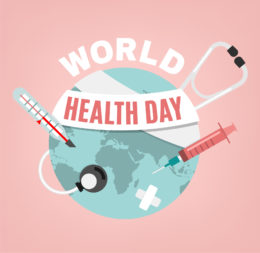
World Health Day is an annual event on April 7th designed to draw attention to particular priorities in global health. Examples of events that take place on this awareness day include conferences for health workers, briefings for local politicians, informational displays for children and adolescents, public marches and demonstrations, and access to medical tests and screenings. World Health Day is sponsored and founded by the World Health Organization more commonly known as WHO which was founded on April 7, 1948, and since its founding year at the First World Health Assembly, delegates called for this annual World Health Day to mark the anniversary of the founding of the World Health Organization. Currently, 193 countries are members of the World Health Organization and since 1948 WHO has continued to carry out valuable work including the eradication of smallpox and global implementation of vaccines and public health strategies. Universal health coverage is WHO’s number one goal, and although progress is being made in some countries around the world, there is still a long way to go. WHO is also a huge advocate of mental health and also works hard to provide universal mental health care. Research has shown that chronic physical health conditions such as diabetes, heart failure, and cancer have a direct adverse effect on an individual’s mental health potentially leading to depression and anxiety. The same holds for those individuals who are living in poverty around the world as a result WHO also hosts a World Mental Health Day that is recognized in October.
The effects of mental illness on children and adolescents are jarring:
- Over 60% of young adults with a mental illness were unable to complete high school.
- Transitional Age Youth (youth between the ages of 16 and 24) with mental illness are four times less likely to be involved in gainful activities (employment, college or trade school).
- Those with a psychiatric disability are three times more likely to be involved in criminal justice activities. Nationally, each year, approx. 157,000 youth between 10 and 24 years of age receive medical care for self-inflicted injuries at emergency departments across the U.S.
- 1 in 12 high school students has attempted suicide.
Children who grow up in poverty, who are refugees, who have been abused and who suffer chronic diseases are more likely to develop mental health disorders when they reach adolescence and adulthood, and therefore their physical health and living conditions are closely linked with their mental and emotional health. Providing access to universal healthcare cannot only help prevent acute and chronic disorders, but it can also prevent complications such as mental health disorders that stem from these physical ailments.